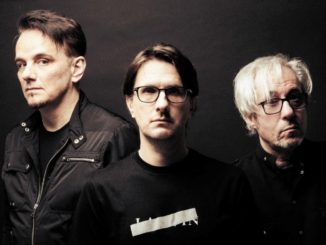[Music For Nations, 2022]

Intro: Dimitris Kaltsas
The return of Porcupine Tree didn’t come as much of a surprise to those who follow Steven Wilson’s career. However, 13 years after the release of The Incident is not little and of course a lot has changed since 2009. First of all, the band’s momemtum is not the same, in fact it was unknown if there was any or if the option of reviving the great band was a forced choice by Wilson after the disappointing The Future Bites.
In any case, the return of Porcupine Tree is by far the most important news for progressive music in 2022 and even without Colin Edwin, whether Closure / Continuation can impress the band’s audience is a huge gamble. And this makes it even more interesting…
Bridging the unpredictability of PT’s comeback with the monumental past, glancing at Steven Wilson’s top solo moments
The tacit retirement of a band whose reputation and artistic displacement had been steadily increasing until The Incident, Steven Wilson’s success with his solo career, but also the whispers of Porcupine Tree’s influence on modern progressive music led to their inevitable return. And if in previous years, primarily Wilson, but also Barbieri and Harrison on the other hand did not make the slightest mention of their new partnership, however no one ruled out that Porcupine Tree would return.
And if the absence of bassist Colin Edwin was felt in the gradually increasing “aggressive marketing” of Porcupine Tree after the initial news of their return as a trio, the first sample with Harridan erased any doubts of the venture and seemed to reduce the time distance to The Incident. So what do Porcupine Tree have to say about their eleventh album after so many years and with Wilson himself having emerged as one of the greatest pop figures of the British progressive sound? And if his masterpiece, The Raven that Refused to Sing was an ode to the original progressive side of the 70s, a fantastic personal touch to the edifice of the vintage aesthetic that extended into the music industry, the successful turn to more pop paths that followed, it increasingly brought to mind Wilson’s adventures with Porcupine Tree, as their exposure to a new audience grew through his constant (and excellent) touring to promote his solo albums. And Gavin Harrison, on the other hand, had the good fortune to tour with the eternally omnipotent brand name of King Crimson and its new line-up, always with Fripp at the helm, and he also participates in the remarkable Pineapple Thief.
Therefore, Closure / Continuation, with a clear self-referential essence in its title, comes in retrospect to justify the reputation of a band that has now conquered its timelessness even after such a long inactive period. And what the listener initially notices is that although the compositions were created over a long period, as they themselves state, they do not sound like the natural continuation of The Incident, and of course they are not fragments of recordings from that period, but new material. And if the opening Harridan that was the precursor to the album gives the necessary Porcupine Tree aura that connects their sound to its timelessness, with all those elements that characterize the group, the continuation is somewhat different, with compositions that vary but also sound familiar at the same time.
Although briefly most sonic references lie somewhere between In Absentia and Fear of A Blank Planet, it’s Wilson’s subsequent solo work that seems to have given the album a major influence. And if the compositions are based primarily on the early Wilson/Harrison collaboration and then Barbieri’s additions and editing, the aforementioned influence is now evident. Mainly The Raven that Refused to Sing and Hand.Cannot.Erase, of course, as these records are the ones that could be part of Porcupine Tree’s discography respectively. But since they preceded Closure / Continuation, their stamp and Wilson’s expertise in tracks like Dignity or Herd Culling are now recognizable elements, which combined with Harrison/Barbieri’s touches (mainly in the soundscapes built by Richard) are now integrated into the identity of this new era of the band. And if Colin Edwin’s absence doesn’t go unnoticed, Wilson’s bass work fills the gaps. With Chimera’s Wreck, the album’s longest track, perhaps has the most associations with the band’s past, as the gradual build of the composition, the solos, the dynamics on the drums and the atmospheric touches on the keys, all these elements are ones reminiscent of (perhaps even repeating) Porcupine Tree in Deadwing and Fear of the Blank Planet.
Still, in a consistency with the logic of boxsets, collectibles, deluxe and different editions, which was also done in the period of Wilson’s solo albums, three excellent compositions that could comfortably fit on the album are presented as additional material, taking away something from the its “normal” version.
So what’s a Porcupine Tree album to say after such a long absence? First of all, it is a release that has to meet the demands of an uncertainty about themselves that has developed over the years and manages to approach a monumental recording past, depending on what each of Porcupine Tree is looking for. Closure / Continuation contains all those elements that made Porcupine Tree popular after In Absentia, bridges with a characteristic Wilson comfort writing recognizable songs, the band’s present with his solo work and is ultimately a release aimed at primarily to their fans and with that it manages to be a successful comeback. Porcupine Tree charms again and sustains its legend with the same successful recipe of well-crafted quality compositions.
8 / 10
Panos Papazoglou
2nd opinion
These sounds were missing for many years from our speakers. The direct riffs, the experimentation with funk, the sounds of Tool and Opeth and the nostalgic references of the 70s through the filter of alt prog, which Porcupine Tree helped establish, all sound pleasant to my ears – the recent solo albums by Steve Wilson could not, for various reasons, fill the gap. The Wilson/Barbieri/Harrison trio seems to have worked a lot on these compositions through the years, sounding very mature. The sequence of the songs reminds me of a peaky sine wave (dynamic to mellow and vice versa) and helps consume the album fairly quickly. The elements of surprise but also cohesion are somewhat missing (the sum of parts seems far greater than the whole) and thus this work is unlikely to be mentioned as one of their top moments. The electronic experimentations in Walk the Plank and the peak achieved during the inspired, epic, Chimera’s Wreck are not enough to achieve this. Maybe this is not needed for now, perhaps the mature return is enough to satisfy our curiosity (until next time) and it certainly does not take away from the group’s legacy…
7 / 10
Thanos Patsos
[Music For Nations, 2022]

Εισαγωγή: Δημήτρης Καλτσάς
Η επιστροφή των Porcupine Tree δεν αποτέλεσε μεγάλη έκπληξη για όσους παρακολουθούν την πορεία του Steven Wilson. Ωστόσο, 13 χρόνια μετά την κυκλοφορία του The Incident δεν είναι λίγα και λογικά πολλά έχουν αλλάξει από το 2009. Πρώτα απ’ όλα, το momemtum δεν είναι το ίδιο, για την ακρίβεια ήταν άγνωστο αν υπήρχε ή αν η επιλογή της αναβίωσης της σπουδαίας μπάντας ήταν μία αναγκαστική επιλογή του Wilson μετά το απογοητευτικό The Future Bites.
Σε κάθε περίπτωση, η επιστροφή των Porcupine Tree είναι μακράν το πιο σημαντικό νέο για την προοδευτική μουσική το 2022 και ακόμα και χωρίς τον Colin Edwin, το κατά πόσο μπορεί το Closure / Continuation να εντυπωσιάσει το κοινό της μπάντας αποτελεί ένα τεράστιο στοίχημα. Κι αυτό το κάνει ακόμα πιο ενδιαφέρον…
Γεφυρώνει το απρόβλεπτο της επιστροφής των PT με το μνημειώδες παρελθόν, λοξοκοιτώντας στις κορυφαίες solo στιγμές του Steven Wilson
Η σιωπηρή απόσυρση ενός συγκροτήματος, του οποίου η φήμη και το καλλιτεχνικό εκτόπισμα ολοένα και αυξανόταν μέχρι και το The Incident, η επιτυχία του Steven Wilson με τη solo καριέρα του, αλλά και οι ψίθυροι για την επιρροή των Porcupine Tree στο σύγχρονο μουσικό γίγνεσθαι του προοδευτικού χώρου οδήγησαν στην αναπόφευκτη επιστροφή τους στα δισκογραφικά δρώμενα. Και αν κατά τα προηγούμενα χρόνια, ο Wilson πρωτίστως, αλλά και οι Barbieri, Harrison από την άλλη δεν έκαναν την παραμικρή αναφορά για τη νέα τους σύμπραξη, ωστόσο κανείς δεν απέκλειε ότι οι Porcupine Tree θα επέστρεφαν.
Και αν η απουσία του μπασίστα Colin Edwin έγινε αισθητή στο σταδιακά αυξανόμενο «επιθετικό μάρκετινγκ» των Porcupine Tree μετά την αρχική είδηση της επιστροφής τους ως τριάδας, τα πρώτα δείγματα με το Harridan, έσβησαν τις όποιες αμφιβολίες του εγχειρήματος και σα να μείωσαν κάπως τη χρονική απόσταση με το μακρινό Incident. Τι έχουν να πουν οι Porcupine Tree λοιπόν με το ενδέκατο άλμπουμ τους τόσα χρόνια μετά και με τον ίδιο τον Wilson να έχει αναδειχθεί σε μια από τις πιο διαχρονικές pop φιγούρες του βρετανικού προοδευτικού ήχου; Και αν το αριστούργημά του, The Raven That Refused To Sing ήταν μια ωδή στη γνήσια προοδευτική του 70’s πλευρά, μια φανταστική προσωπική πινελιά στο οικοδόμημα της vintage αισθητικής που επεκτάθηκε στη μουσική βιομηχανία, η επιτυχημένη στροφή σε πιο pop μονοπάτια που ακολούθησε μετά από λίγο, έφερνε ολοένα και περισσότερο στο νου τις περιπέτειες του Wilson με τους Porcupine Tree, μιας και η γνωριμία τους με ένα νέο κοινό αυξανόταν και μέσα από τις συνεχείς (και εξαιρετικές) περιοδείες του για την προώθηση των προσωπικών του άλμπουμ. Και ο Gavin Harisson από την άλλη, είχε την ευτυχή συγκυρία να περιοδεύει με το διαχρονικά παντοδύναμο brandname των King Crimson και την αναθεωρημένη του σύνθεση, πάντα με τον Fripp στο τιμόνι, αλλά και να συμμετέχει στους αξιόλογους Pineapple Thief.
Το Closure / Continuation λοιπόν, με σαφή αυτοαναφορική υπόσταση στον τίτλο του, έρχεται ετεροχρονισμένα να δικαιώσει τη φήμη ενός συγκροτήματος που έχει πλέον κατακτήσει τη διαχρονικότητά του ακόμα και μετά από μια τόσο μεγάλη ανενεργή περίοδο. Και αυτό που εν αρχής διακρίνει ο ακροατής είναι ότι παρόλο οι συνθέσεις που διανθίζουν το άλμπουμ έχουν δημιουργηθεί σε μια μακρά περίοδο, όπως δηλώνουν και οι ίδιοι, δεν ακούγονται σαν τη φυσική συνέχεια του Incident, και φυσικά δεν αποτελούν σπαράγματα ηχογραφήσεων εκείνης της περιόδου, αλλά νέο υλικό. Και αν το εναρκτήριο Harridan που αποτέλεσε τον προπομπό του άλμπουμ δίνει την απαραίτητη Porcupine Tree αύρα που συνδέει τον ήχο τους στη διαχρονία του, με όλα εκείνα τα στοιχεία που χαρακτηρίζουν το γκρουπ, η συνέχεια είναι κάπως διαφορετική, με συνθέσεις που ποικίλλουν, αλλά ακούγονται και γνώριμες ταυτόχρονα.
Παρόλο που εν συντομία οι περισσότερες ηχητικές παραπομπές βρίσκονται κάπου μεταξύ του In Absentia και του Fear of A Blank Planet, οι προσωπικές δουλειές του Wilson που ακολούθησαν είναι αυτές που στο φαίνεται να έχουν προσδώσει μια μεγάλη επιρροή στο άλμπουμ. Και αν οι συνθέσεις βασίζονται κυρίως στην πρώιμη συνεργασία μεταξύ Wilson/Harrison και εν συνεχεία στις προσθήκες και την επιμέλεια του Barbieri, είναι φανερή πλέον η παραπάνω αναφερόμενη επιρροή. Κυρίως του The Raven that Refused to Sing και του Hand.Cannot.Erase βέβαια, καθώς οι συγκεκριμένοι δίσκοι είναι και αυτοί που θα μπορούσαν να είναι και μέρος της δισκογραφίας των Porcupine Tree αντίστοιχα. Αλλά εφόσον έχουν προηγηθεί του Closure/Continuation, η σφραγίδα τους και η τεχνογνωσία του Wilson πια σε κομμάτια σαν το Dignity ή το Herd Culling είναι πλέον αναγνωρίσιμα στοιχεία, τα οποία σε συνδυασμό με τις πινελιές των Harrison/Barbieri (κυρίως στα ηχοτοπία που κτίζει ο δεύτερος) είναι πλέον ενσωματωμένα στην ταυτότητα της νέας αυτής εποχής του συγκροτήματος. Και αν η απουσία του Colin Edwin δεν περνάει απαρατήρητη, η δουλειά που αναλαμβάνει ο Wilson στο μπάσο καλύπτει τα κενά. Με το Chimera’s Wreck, το μεγαλύτερο κομμάτι του άλμπουμ, ενδεχομένως να γίνονται και οι περισσότεροι συνειρμοί με το παρελθόν της μπάντας, καθώς το σταδιακό κτίσιμο της σύνθεσης, τα solos, οι δυναμικές στα τύμπανα και οι ατμοσφαιρικές πινελιές στα πλήκτρα, όλα αυτά τα στοιχεία είναι εκείνα που θυμίζουν (ίσως επαναλαμβάνουν κιόλας) τους Porcupine Tree του Deadwing και του Fear of The Blank Planet.
Ακόμα, με μια συνέπεια στη λογική των boxsets, των συλλεκτικών, πολυτελών και διαφορετικών εκδόσεων, κάτι που έγινε και την περίοδο των προσωπικών άλμπουμ του Wilson, τρεις εξαιρετικές συνθέσεις που θα μπορούσαν να χωρέσουν με άνεση στο άλμπουμ παρουσιάζονται ως επιπρόσθετο υλικό αφαιρώντας κάτι από την «κανονική» του έκδοση.
Επομένως τι έχει να πει ένα άλμπουμ των Porcupine Tree μετά από μια τέτοια μακροχρόνια απουσία; Καταρχάς είναι μια κυκλοφορία που έχει να ανταποκριθεί στις απαιτήσεις μιας αβεβαιότητας για τους ίδιους που αναπτύχθηκε με τα χρόνια και να καταφέρει να προσεγγίσει ένα μνημειώδες δισκογραφικό παρελθόν, ανάλογα και τι επιζητά ο καθένας από τους Porcupine Tree. Το Closure / Continuation περιέχει όλα εκείνα τα στοιχεία που έκαναν τους Porcupine Tree δημοφιλείς μετά το In Absentia, γεφυρώνει με μια χαρακτηριστική άνεση του Wilson να γράφει αναγνωρίσιμα τραγούδια, το παρόν της μπάντας με τις solo δουλειές του και σε τελική ανάλυση είναι μια κυκλοφορία που απευθύνεται πρωτίστως στους οπαδούς τους και με αυτό καταφέρνει να καταστεί μια επιτυχής επιστροφή. Οι Porcupine Tree γοητεύουν ξανά και συντηρούν το μύθο τους με τη ίδια πετυχημένη συνταγή των καλοδουλεμένων ποιοτικών συνθέσεων.
8 / 10
Πάνος Παπάζογλου
2η γνώμη
Έλειπε ο ήχος αυτός εδώ και πολλά χρόνια από τα ηχεία μας! Η αμεσότητα των riffs, ο πειραματισμός με funk / Tool / Opeth και οι νοσταλγικές αναφορές στα 70s μέσα από το φίλτρο του alt prog που και οι ίδιοι βοήθησαν να παγιωθεί, όλα ηχούν ευχάριστα στα αυτιά μου, ενώ οι πρόσφατες προσωπικές δουλειές του Wilson δεν μπόρεσαν για διάφορους λόγους να αναπληρώσουν το κενό. Το τρίο των Wilson / Barbieri / Harrison φαίνεται ξεκάθαρα ότι έχει δουλέψει πολύ αυτές τις συνθέσεις μέσα στα χρόνια που πέρασαν και ηχούν πολύ ώριμες. H αλληλουχία των συνθέσεων παραπέμπει σε έντονο ημιτονοειδές κύμα (δυναμικές εναλλάσσονται με μελαγχολικές / υποτονικές) και βοηθάει στο να «καταναλωθεί» εύκολα ο δίσκος από τον ακροατή. Τα στοιχείο της έκπληξης αλλά και της συνοχής λείπουν (το άθροισμα των μερών φαίνεται κατά πολύ ισχυρότερο του συνόλου) και έτσι αυτή η δουλειά δεν προσφέρεται για μνημόνευση μεταξύ των κορυφαίων τους. Οι ηλεκτρονικοί πειραματισμοί του Walk the Plank και η κορύφωση στο εμπνευσμένο, επικό Chimera’s Wreck δε φτάνουν για να το βάλουν σε αυτήν την κατηγορία. Ίσως δεν χρειάζεται, ίσως η ώριμη επιστροφή φτάνει για να ικανοποιήσει την περιέργεια μας (μέχρι την επόμενη φορά) και σίγουρα δεν αφαιρεί τίποτα από την αξία του γκρουπ…
7 / 10
Θάνος Πάτσος



